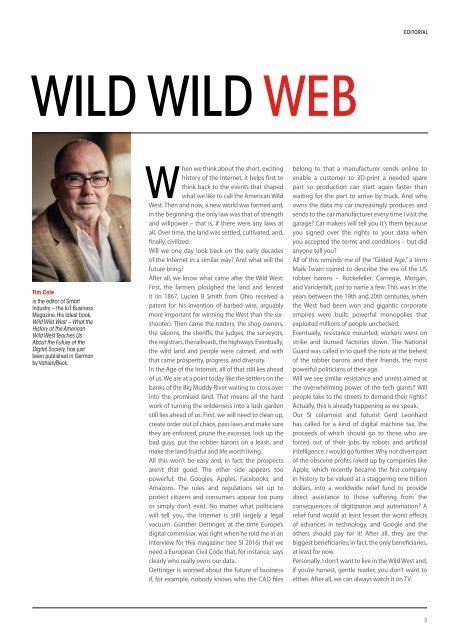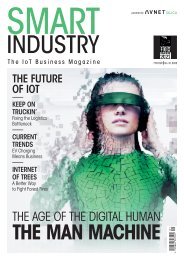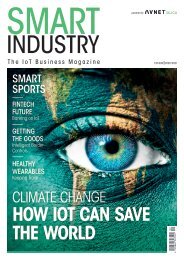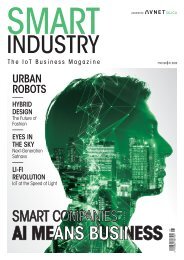Smart Industry 2/2018
Smart Industry 2/2018 - The IoT Business Magazine - powered by Avnet Silica
Smart Industry 2/2018 - The IoT Business Magazine - powered by Avnet Silica
You also want an ePaper? Increase the reach of your titles
YUMPU automatically turns print PDFs into web optimized ePapers that Google loves.
Editorial<br />
Wild Wild Web<br />
Tim Cole<br />
is the editor of <strong>Smart</strong><br />
<strong>Industry</strong> – the IoT Business<br />
Magazine. His latest book,<br />
Wild Wild West – What the<br />
History of the American<br />
Wild West Teaches Us<br />
About the Future of the<br />
Digital Society, has just<br />
been published in German<br />
by Vahlen/Beck.<br />
When we think about the short, exciting<br />
history of the Internet, it helps first to<br />
think back to the events that shaped<br />
what we like to call the American Wild<br />
West. Then and now, a new world was formed and,<br />
in the beginning, the only law was that of strength<br />
and willpower – that is, if there were any laws at<br />
all. Over time, the land was settled, cultivated, and,<br />
finally, civilized.<br />
Will we one day look back on the early decades<br />
of the Internet in a similar way? And what will the<br />
future bring?<br />
After all, we know what came after the Wild West:<br />
First, the farmers ploughed the land and fenced<br />
it (in 1867, Lucien B Smith from Ohio received a<br />
patent for his invention of barbed wire, arguably<br />
more important for winning the West than the sixshooter).<br />
Then came the traders, the shop owners,<br />
the saloons, the sheriffs, the judges, the surveyors,<br />
the registrars, the railroads, the highways. Eventually,<br />
the wild land and people were calmed, and with<br />
that came prosperity, progress, and diversity.<br />
In the Age of the Internet, all of that still lies ahead<br />
of us. We are at a point today like the settlers on the<br />
banks of the Big Muddy River waiting to cross over<br />
into the promised land. That means all the hard<br />
work of turning the wilderness into a lush garden<br />
still lies ahead of us. First, we will need to clean up,<br />
create order out of chaos, pass laws and make sure<br />
they are enforced, prune the excesses, lock up the<br />
bad guys, put the robber barons on a leash, and<br />
make the land fruitful and life worth living.<br />
All this won’t be easy and, in fact, the prospects<br />
aren’t that good. The other side appears too<br />
powerful: the Googles, Apples, Facebooks, and<br />
Amazons. The rules and regulations set up to<br />
protect citizens and consumers appear too puny<br />
or simply don’t exist. No matter what politicians<br />
will tell you, the Internet is still largely a legal<br />
vacuum. Günther Oettinger, at the time Europe’s<br />
digital commissar, was right when he told me in an<br />
interview for this magazine (see SI 2016) that we<br />
need a European Civil Code that, for instance, says<br />
clearly who really owns our data.<br />
Oettinger is worried about the future of business<br />
if, for example, nobody knows who the CAD files<br />
belong to that a manufacturer sends online to<br />
enable a customer to 3D-print a needed spare<br />
part so production can start again faster than<br />
waiting for the part to arrive by truck. And who<br />
owns the data my car increasingly produces and<br />
sends to the car manufacturer every time I visit the<br />
garage? Car makers will tell you it’s them because<br />
you signed over the rights to your data when<br />
you accepted the terms and conditions – but did<br />
anyone tell you?<br />
All of this reminds me of the “Gilded Age,” a term<br />
Mark Twain coined to describe the era of the US<br />
robber barons – Rockefeller, Carnegie, Morgan,<br />
and Vanderbilt, just to name a few. This was in the<br />
years between the 19th and 20th centuries, when<br />
the West had been won and gigantic corporate<br />
empires were built: powerful monopolies that<br />
exploited millions of people unchecked.<br />
Eventually, resistance mounted; workers went on<br />
strike and burned factories down. The National<br />
Guard was called in to quell the riots at the behest<br />
of the robber barons and their friends, the most<br />
powerful politicians of their age.<br />
Will we see similar resistance and unrest aimed at<br />
the overwhelming power of the tech giants? Will<br />
people take to the streets to demand their rights?<br />
Actually, this is already happening as we speak.<br />
Our SI columnist and futurist Gerd Leonhard<br />
has called for a kind of digital machine tax, the<br />
proceeds of which should go to those who are<br />
forced out of their jobs by robots and artificial<br />
intelligence. I would go further. Why not divert part<br />
of the obscene profits raked up by companies like<br />
Apple, which recently became the first company<br />
in history to be valued at a staggering one trillion<br />
dollars, into a worldwide relief fund to provide<br />
direct assistance to those suffering from the<br />
consequences of digitization and automation? A<br />
relief fund would at least lessen the worst effects<br />
of advances in technology, and Google and the<br />
others should pay for it! After all, they are the<br />
biggest beneficiaries; in fact, the only beneficiaries,<br />
at least for now.<br />
Personally, I don’t want to live in the Wild West and,<br />
if you’re honest, gentle reader, you don’t want to<br />
either. After all, we can always watch it on TV.<br />
3
















